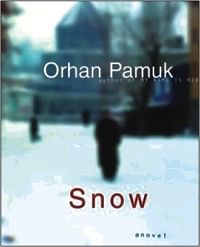Mixing bowl of titanic philosophies

Snow
Orhan Pamuk
Faber and Faber
As the soft snow forms a delicate carpet on the streets of Kars, Ka, the poet and journalist, arrives to investigate the case of the suicidal girls. The walls are plastered with posters bellowing: "Suicide is Blasphemy", but the epidemic doesn't stop to spread. There is a haunting sense of alienation in this overlooked town marred by the disputes between Western secularism and Eastern fundamentalism. The overbearing desolation "…hit him [Ka] with such force that he felt God inside him." Thus begins Pamuk's novel, Snow.
Kars, the poorest corner of Turkey and the background of this novel, is the mixing bowl for titanic philosophies like socialism, communism, atheism, political secularism, ethnic nationalism (especially the Kurds), and the most rapidly growing movement, Islamist fundamentalism. Although probing the suicides is Ka's main motive, he is driven by an urge to meet his love, Ipek. Ipek has separated from her husband because he had forced her to wear headscarves and now is the chance for Ka to marry her. Ipek's father, Mr. Bey, is an old communist and atheist who runs a hotel in the town. On the other hand, Ipek's sister is in love with a hiding so-called Islamist terrorist, Blue. On his journey through this pale white, snow buried landscape Ka meets several eccentric characters, one of whom tells him: "If unhappiness were a genuine reason for suicide, half the women of Turkey would be killing themselves."
So what is the cause of these suicides? What can persuade these girls to suddenly decide to die? The religion-based groups blame it on the banning of headscarves for girls. An assassination follows! The Director of Education, who on orders from the government, had banned the 'headscarf girls' from school, is shot in a coffee shop by a young freedom fighter who argues with the director irrationally before shooting him. Ka witnesses the murder and is soon contacted by the leader, Blue.
From an atheist poet, Ka becomes a bridge between the conservative Eastern world and the over-exposed West. Inspired by such a sinister atmosphere, Ka writes poem after poem. He is highlighted by the daily newspaper and is invited to recite his poem in the National Theater. Even the place for peaceful art, the theatre, becomes a purgatory as many are massacred in the middle of a play!
The conflict is not just on the streets; it is inside the lives of the characters as well. Ipek cannot decide if she wants to marry Ka and move with him to Germany. Ka fights within himself at having found a long-lost godliness, as he says, "Before I got here, I hadn't written a poem in years … But since coming to Kars, all the roads on which poetry travels here have reopened. I attribute this to the love of God I've felt here."
But the Islamist leader disagrees, "I don't want to destroy your illusions, but your love of God comes out of Western romantic novels," said Blue. "In a place like this, if you worship God as a European, you're bound to be a laughingstock. Then you cannot even believe you believe. You don't belong to this country; you're not even a Turk anymore. First try to be like everyone else then try to believe in God."
The dispute is everywhere, from every heart to every footpath! There are sharp anti-western proclamations that are sure to missile and stun the readers. For an instance, one character says: "To play the rebel heroine in Turkey you don't pull off your scarf, you put it on." And in another place: "I am proud of the part of me that isn't European. I'm proud of the things in me that the Europeans find childish, cruel, and primitive. If the Europeans are beautiful, I want to be ugly; if they're intelligent, I prefer to be stupid; if they're modern let me stay pure."
Snow is like a many-layered cake. Pamuk offers many perspectives about interconnected topics like poverty, religion, politics, modernization; but it is your choice to support one point and refuse another. It moves slowly and the incidents though sounds exciting are not action-packed at all. Instead, Pamuk focuses more on WHY and so the pace slows down. At the peak of it, Snow attempts to answer why a person becomes what we call an Islamic fundamentalist or rather a terrorist.
Definitely a thought-stirring read! And don't forget, understanding is everything, even when it changes nothing. Perhaps it is all we, at times, can do.
Efadul Huq is a freelance writer and reviews books periodically.

 For all latest news, follow The Daily Star's Google News channel.
For all latest news, follow The Daily Star's Google News channel. 



Comments